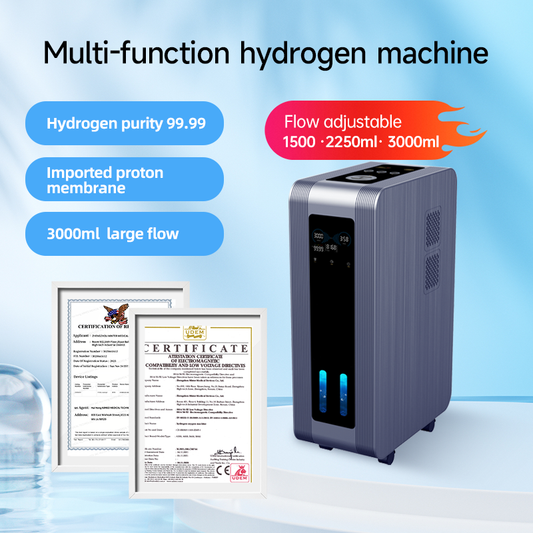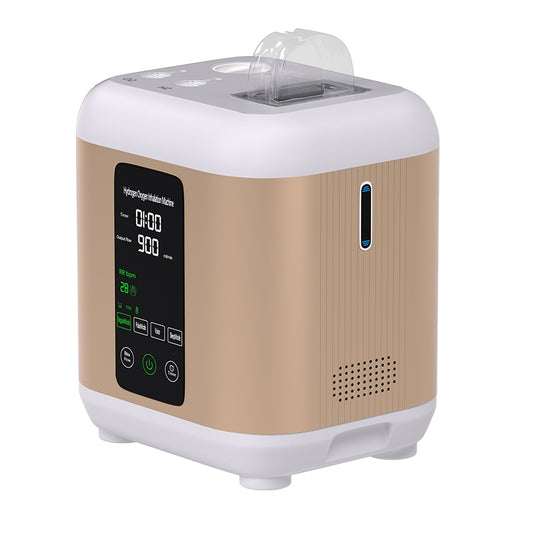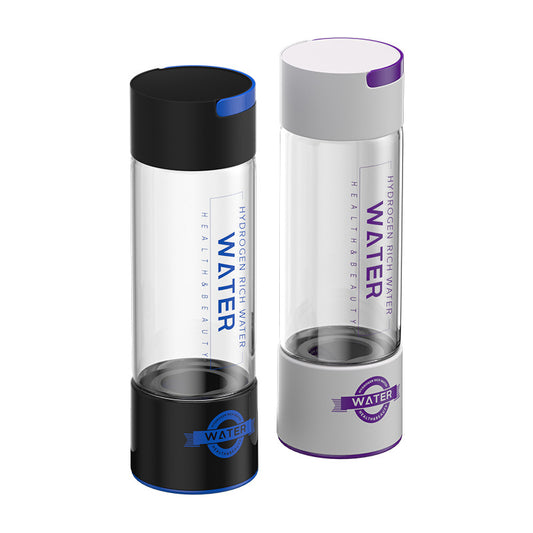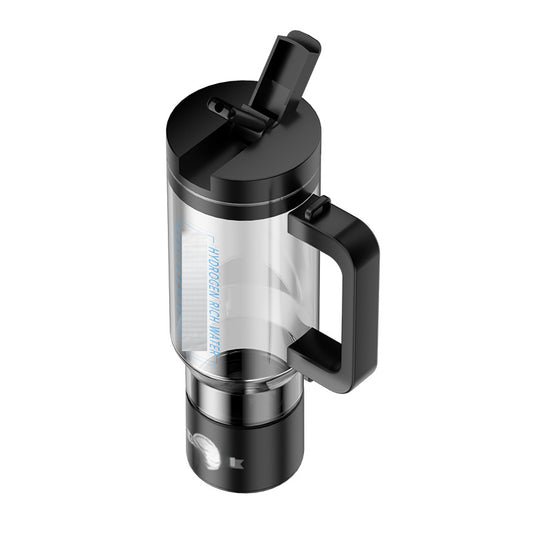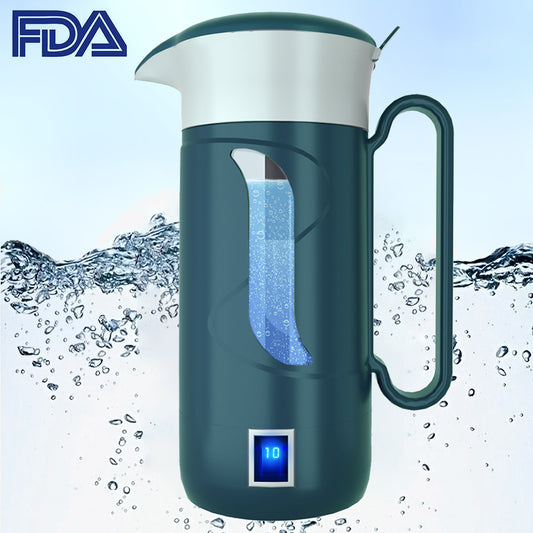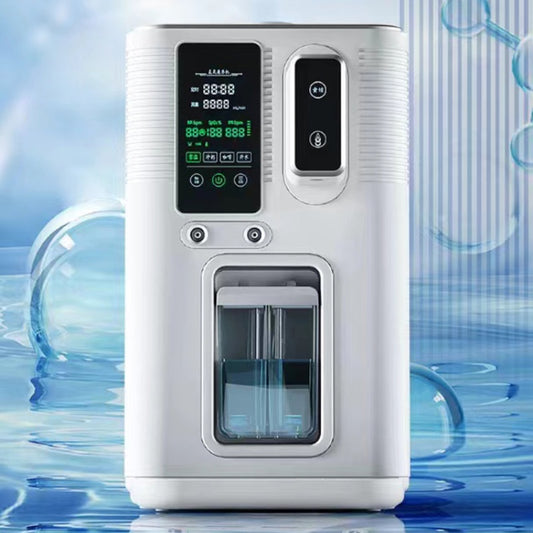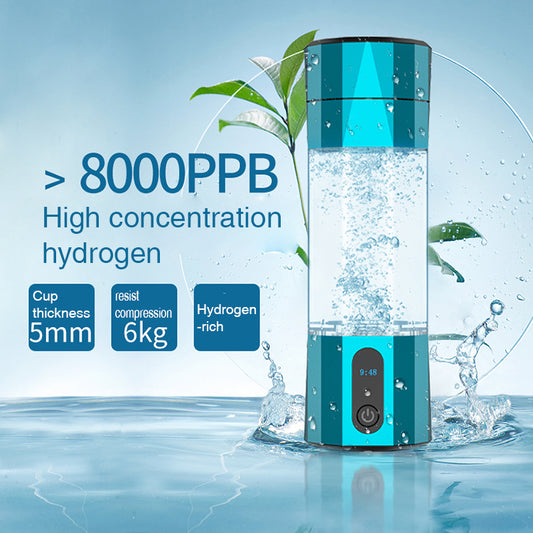Collection: Products
-
High Pressure Steamer Steam Cleaning Machine for Range Hood/Air Conditioner/Refrigerator 3000W 0.4-0.6Mpa Steamer
Regular price $99.00Regular priceUnit price / per -
High Temperature and High Pressure Housekeeping Cleaning Handheld Steam Cleaner Efficient & Lightweight 2L DC 110-220V 1500W
Regular price $300.00Regular priceUnit price / per -
High-Flow Hydrogen Inhaler 3000 ml/min High-Performance Hydrogen Generator for Home Use and Health
Regular price $1,999.00Regular priceUnit price / per -
Hot Selling Portable Fruit Washer Food Purifier Disinfector Cleaning Machine Fruit And Vegetable Washer
Regular price $42.00Regular priceUnit price / per -
Housekeeping Cleaning Upgrade High Temperature High Pressure Steam Cleaner 5 bar Interior Cleaning Machine
Regular price $160.00Regular priceUnit price / per -
Hydrogen Generator Hydrogen Inhaler 225ML PEM SPE Pure Water Electrolyzer 150ml Hydrogen + 75ml Oxygen Therapy Machine
Regular price $359.00Regular priceUnit price / per -
Hydrogen Generator Water Bottle 250ML Ph Water Machine 5000PPB 99.99% Pure Hydrogen Inhalation Therapy Bottle
Regular price $99.00Regular priceUnit price / per -
Hydrogen Inhalation Machine 99.99% Purity Dual Outlet H2 Generator PEM Water Electrolysis Ionizer Hydrogen production 150ml/200ml/450ml
Regular price From $299.00Regular priceUnit price / per -
Hydrogen Inhalation Machine HO Mixed 450ml/min(300H+150O), SPE PEM Water Ionizer Hydrogen Inhalation Therapy Machine
Regular price From $799.00Regular priceUnit price / per -
Hydrogen Inhalation Machine PME Pure Water Electrolyzer Hydrogen inhaler Brown's gas 600/900 ML
Regular price From $699.00Regular priceUnit price / per -
Hydrogen Water Bottle 480ml Portable Water Powered Generator 3000-5000PPB PEM Water Electrolysis Ionizer
Regular price $89.00Regular priceUnit price / per -
Hydrogen Water Bottles 1000ml Portable Water Powered Generator 1L Hydrogen Water Generator
Regular price $159.00Regular priceUnit price / per -
Hydrogen-Rich Kettle Electrolytic Weakly Alkaline Kettle 1500ml
Regular price $159.00Regular priceUnit price / per -
Hydrogen-rich Water Machine 900ml/min TDS Alkaline Water Dispenser 4000-6000ppb Water Ionizer Machine
Regular price $999.00Regular priceUnit price / per -
Molecular Hydrogen Water Machine 6000 Ml/Min 100-240v Hydrogen Inhalation Machine
Regular price $4,300.00Regular priceUnit price / per -
Molecular Hydrogen Water Machine 7L Alkaline Water 3000-6000PPB 4 Levels Filtration 5 Levels of Temperature 3 min fast Heating
Regular price $399.00Regular priceUnit price / per -
Ozone Generator For Food Removal Of Agricultural Residues In Fruits And Vegetables Home Ozone Generator 110v/220v
Regular price $60.00Regular priceUnit price / per -
Portable Hydrogen Inhaler Hydrogen Absorbing Machine Generator Air Ionizers 450ml PEM Water Electrolysis Ionizer
Regular price $599.00Regular priceUnit price / per -
Portable Hydrogen Machine for Inhalation and Hydrogen Water, 160ml/min H2 Generator Inhaler SPE PEM Ionizer
Regular price $339.00Regular priceUnit price / per -
Portable Hydrogen Water Generator Bottle 6000ppb Hydrogen Water 208ml
Regular price $89.00Regular priceUnit price / per -
Portable Intelligent Hydrogen and Oxygen Generator 225ml Hydrogen Breathing Machine with Dual Outlet Gas Regulator
Regular price $359.00Regular priceUnit price / per -
Pressure 3.0BAR High Pressure Steam Cleaner Handheld Portable Multi-function High Temperature Steam Cleaner
Regular price $59.00Regular priceUnit price / per
Best Service For You
-
Service
We offer 24 months warranty for all our products
-
Shipping
Free shipping all over the world
-
To be our partner
We are manufacturer in China, we offer wholesale price if you want to sell our products in your country. Feel free to contact with us
FAQ
What're the benefits to inhale hydrogen?
Hydrogen has fast movement speed and strong penetration. After entering the human body, it is very easy to reach all parts of the body and the inside of tissues and cells. It is the only known antioxidant that has a selective effect on free radicals.
First, for all kinds of life-threatening severe cases, such as heart attack, stroke, and cardiac arrest, breathing hydrogen in the rescue process can be very good to alleviate the severity, or can save life; Secondly, all kinds of difficult and complicated diseases, such as tumor, rheumatoid disease, uremia, Alzheimer’s disease, etc., can be improved by hydrogen aspiration. Hydrogen aspiration can reduce the side effects of radiotherapy and chemotherapy and help to inhibit tumor recurrence and metastasis. Moreover, the earlier hydrogen intervention, the greater the value of preventing tumor diseases.
Is inhaling hydrogen good for us?
An increasing number of studies have revealed thathydrogen may protect the lungs from diverse diseases, including acute lung injury, chronic obstructive pulmonary disease, asthma, lung cancer, pulmonary arterial hypertension, and pulmonary fibrosis.
What are the side effects of hydrogen therapy?
Molecular hydrogen is generally considered nontoxic, even at high doses, and side effects have rarely been reported. In one study using hydrogen-rich water, a few participants experienced loose stools, heartburn, and headaches; however, there was no placebo group to compare to.
Are there any scientific studies supporting the efficacy of hydrogen inhalation therapy?
Scientific studies have explored hydrogen inhalation therapy's effects, showing promise for various health conditions like inflammation, oxidative stress, and neurological disorders. Further research is required to confirm its mechanisms and application
Are there any ongoing clinical trials or research on hydrogen inhalation therapy, and what are the latest findings?
Several clinical trials have already demonstrated promising results. For example, a July 2023 study from Canada showed H2 therapy can protect kidneys after cardiac transplant in an animal model. [3]
An April 2023 Korean study, showed the effects of H2 as a potent antioxidant for promoting health aging and improving the gut biome. [4]
An April 2023 Chinese study recommending H2 to be part of treatment for metabolic issues. [5]
And a March 2023 Japanese study showed that H2 has the potential to help preserve brain function post cardiac arrest.[6]
What is a hydrogen inhaler, and how does it work?
A hydrogen inhaler utilizes a process called electrolysis to generate molecular hydrogen (H2) gas, which is then inhaled for its potential health benefits.
During electrolysis, water molecules (H2O) are split into hydrogen and oxygen gases through the application of an electric current. The hydrogen gas produced is captured and collected for inhalation purposes.
The scientific rationale behind hydrogen inhalation therapy lies in hydrogen's role as a potent antioxidant and anti-inflammatory agent. Once inhaled, molecular hydrogen is thought to penetrate cell membranes and reach intracellular compartments, neutralizing harmful free radicals and reducing oxidative stress. Additionally, hydrogen has been shown to modulate inflammation, potentially offering therapeutic effects in various conditions.
As research in this area continues to advance, hydrogen inhalation therapy holds promise as a non-invasive and potentially effective approach to promote overall well-being and support various health conditions. However, it is crucial to note that further studies are needed to better understand the mechanisms involved and to establish clear guidelines for its safe and optimal use. As with any emerging therapeutic modality, consulting healthcare professionals and reputable sources for up-to-date information is essential.







